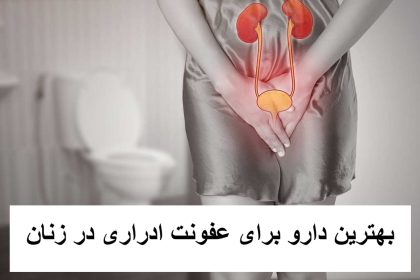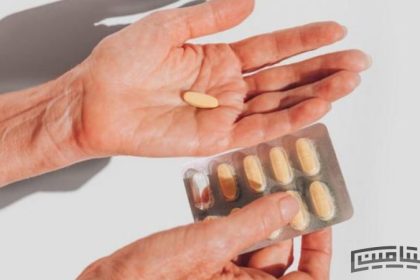What is the ketogenic diet and what are its benefits and side effects? What should we eat and what should we not eat in this diet? Keto diet has different types, but the main source of your nutrition in all of them is protein and fat. Ketogenic has become very popular these days. Many people claim that they have succeeded in losing a lot of weight and reaching their goals with this diet.
In this article, we are going to fully introduce the ketogenic diet and tell about its benefits and side effects, and also give a sample diet for it.
What is the ketogenic diet?
The ketogenic diet, often referred to as the keto diet, is an eating plan in which fat and protein are abundant and carbohydrates are very, very low (or even completely eliminated). The goal of the ketogenic diet is to replace carbohydrates with fat and burn fat. Simply put, you force your body to use fat instead of carbohydrates for energy.
There are different versions of this diet, but the most researched version is the “standard keto diet” and we will review this standard diet in this article.
It is interesting to know that this diet was originally used to treat drug-resistant epilepsy, but it became very popular and widespread when people realized that it could help them lose weight!
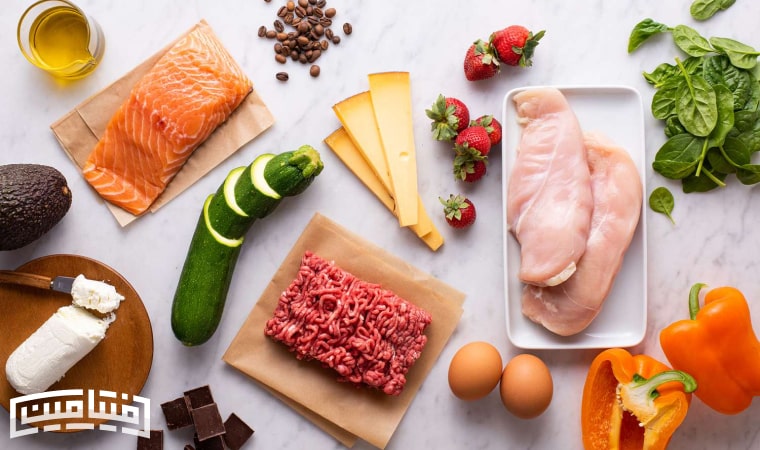
How does the ketogenic diet work on the body?
Normally, when you eat carbohydrates every day, your body turns to these carbohydrates for energy. But when the intake of carbohydrates is cut off, the body must go to another source of energy, namely fat, and this means consuming fat and burning fat!
The whole way the keto diet works is to force your body to use a different type of fuel. Instead of relying on sugar (glucose) from carbohydrates (such as wheat, barley, rice, beans), the body must turn to ketones, a type of fuel produced from stored fat. This state is called ketosis.
Entering ketosis requires depriving yourself of carbohydrates, that is, consuming less than 20 to 50 grams of carbohydrates per day. Keep in mind that an average banana has about 27 grams of carbs or an average baked potato has 41 grams of carbs, so the ketogenic diet is tough and requires careful planning.
How does completely eliminating carbohydrates affect weight loss?
Extensive research has been done on the relationship between carbohydrate elimination and weight loss, and all studies unanimously confirm the effect of carbohydrate elimination on weight loss. But how cutting out carbs causes weight loss has a few different reasons.
Normally, when you eat carbohydrates, a lot of glucose enters the bloodstream and the blood sugar level rises. But when carbs are cut, blood insulin levels drop, and your body gets the signal to burn stored fat for energy instead of storing fat. In other words, the lower and lower the glucose, the more the body is forced to burn fat.
Also, in the first few days when you have restricted and eliminated carbohydrates, you will also lose a lot of water, and as a result, you will experience a rapid weight loss.
But that’s not all. By consuming more protein, you will feel fuller for longer. In addition, the keto diet can affect appetite-regulating hormones such as leptin and ghrelin and reduce the secretion of these hormones. Finally, when you restrict carbohydrates, you often naturally reduce your caloric intake as well.
Health benefits of the ketogenic diet
What are the benefits of the ketogenic diet? In this section, we would like to introduce you to the various advantages and benefits of this food plan.
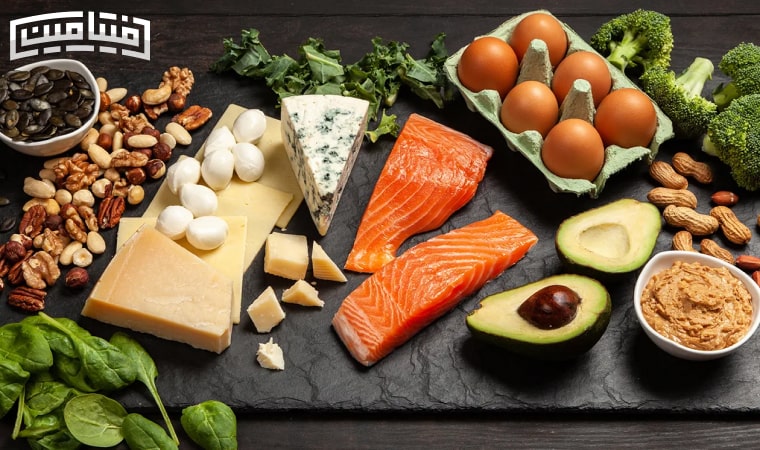

1. Lose weight without burning muscle
The first benefit of the keto diet is that it makes you slim. But this weight loss is not very difficult, because you don’t feel very hungry, also it is a healthy way to burn fat.
Also, since you are consuming a lot of animal proteins, you can rest assured that your body is not burning muscle, but burning fat.
2. Improvement of facial pimples and acne
Acne has many causes. But one of the most important reasons is the consumption of carbohydrates and blood sugar. When your diet is rich in processed and refined carbohydrates, the balance of gut bacteria changes, and this significant increase and decrease in blood sugar negatively affects skin health. A lot of evidence shows that removing carb acne also gets better.
3. Reducing the risk of some cancers
Researchers have investigated the effects of the ketogenic diet in helping to prevent or even cure some cancers. A reputable 2018 study found that since the ketogenic diet lowers blood sugar, it can also reduce the risk of insulin side effects. Insulin is a hormone that controls blood sugar and may be associated with some cancers.
4. Improves PCOS symptoms
Polycystic ovary syndrome (PCOS) is a common hormonal disorder among women that causes ovulation disorders. Research shows that low-carb diets can improve PCOS symptoms, such as weight loss, hormone balance, and blood sugar control.
Allowed and forbidden foods and fruits in the keto diet
If you are planning to start this diet, we recommend two important points. One is to reduce the consumption of sugar, caffeine and alcohol a few days before starting keto so that it is easier to enter this diet. Second, consult your doctor, especially if you have a specific medical condition. Now we will name the allowed and non-allowed foods in the keto diet.
Suitable foods in the keto diet
Foods that are generally allowed include various sources of fat and protein. You should base most of your meals around these foods:
- Red and white meat: Beef, veal, poultry such as chicken and turkey, steak.
- Fatty fish: Salmon, trout, tuna and mackerel.
- Cheese: Unprocessed cheeses such as cheddar or mozzarella.
- Nuts and seeds: Almonds, walnuts, flax seeds, pumpkin seeds, chia seeds, etc.
- Healthy oils: Extra virgin olive oil and avocado oil.
- Avocado: Whole avocado or freshly made guacamole.
- Low carb vegetables: All kinds of green vegetables, tomatoes, onions, peppers, etc.
- seasoning and spices: Salt, pepper, herbs and spices.
- Eggs, cream and butter.
When following a keto diet, be sure to eat plenty of non-starchy vegetables like kale and spinach, which are very low in carbs but packed with valuable vitamins and minerals.
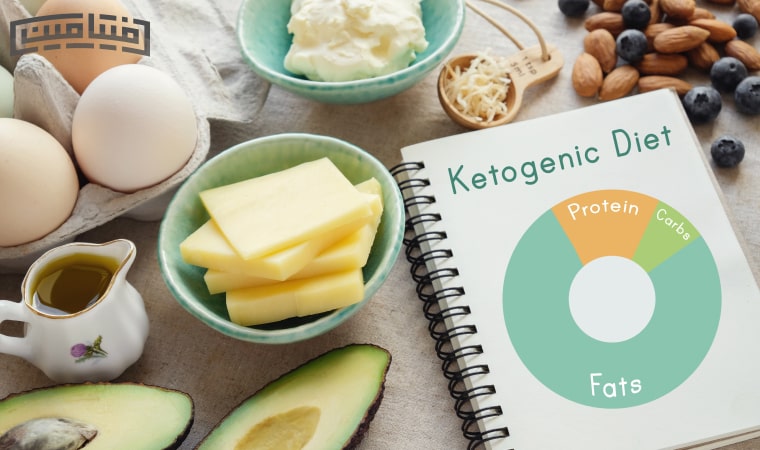

Prohibited foods in the keto diet
The keto diet cuts carbs to less than 50 grams per day, so it’s no surprise that you have to cut out all breads, pasta, rice, and grains. You should also be careful about what you drink. Consumption of fruit juice and carbonated drinks should be stopped. Here is a list of foods to reduce or eliminate on a ketogenic diet. Any food that is high in carbohydrates should be limited.
- Sweet foods: Soda, fruit juice, smoothie, cake, ice cream, candy, etc.
- Cereals or anything with starch: Wheat products such as pasta, pasta, rice bread, etc.
- fruit: All sugary fruits are allowed, of course, berries such as strawberries.
- Legumes: Peas, beans, lentils, cowpeas, etc.
- Root vegetables: Potatoes, carrots, yolks, parsnips, etc.
- Some condiments or sauces: BBQ sauce, honey mustard, teriyaki sauce, ketchup, etc.
- Unhealthy fats: Processed vegetable oils, mayonnaise, etc.
- Alcohol: Beer, wine, mixed drinks.
- Sugar-free diet foods: Sugar-free candies, syrups, puddings, sweeteners, desserts, etc.
Example of a 7-day ketogenic diet
In order to get to know this diet well, we bring you a sample of a one-week ketogenic diet plan.
first day
- Breakfast: half an egg with vegetables of your choice such as tomato, bell pepper, lettuce
- Lunch: Chicken salad with lettuce, olives, olive oil and feta cheese
- Dinner: Salmon with vegetables cooked in butter
second day
- Breakfast: Egg omelette with tomatoes, basil and spinach
- Lunch: steak with vegetables
- Dinner: Almond milk, peanut butter, spinach, cocoa powder, and stevia milkshake with half a sliced strawberry.
The third day
- Breakfast: Almond milk chia pudding with coconut and blackberries
- Lunch: Avocado and shrimp salad
- Dinner: Veal with parmesan cheese, broccoli and lettuce salad
The fourth day
- breakfast: Omelet with avocado, pepper, onion and pickled spices
- Lunch: A handful of nuts and celery sticks with guacamole and salsa
- Dinner: Roasted chicken with basil and cream cheese and pumpkin
the fifth day
- Breakfast: Greek yogurt without sugar, rice cake with peanut butter and berries
- Lunch: Minced meat with mushrooms and onions sandwiched in a sheet of lettuce
- Dinner: chicken, cabbage and mixed vegetables
The sixth day
- Breakfast: cream cheese with walnuts and grilled mushrooms
- Lunch: eggplant and beetroot without bread
- Dinner: white fish cooked in olive oil with kale
the seventh day
- Breakfast: scrambled eggs and mushrooms
- Lunch: chicken with sesame and broccoli
- Dinner: grated zucchini with minced meat and onions fried in olive oil


Types of ketogenic diet
Ketogenic diet is generally a diet that tries to put the body into ketosis by lowering the consumption of carbohydrates. A state in which the body breaks down fat into ketones and uses ketones as an energy source instead of glucose. But still, there are different methods to create a state of ketosis and different types of ketogenic diets have been designed so far. In the following, we will name some of the most famous types of keto diet.
High protein ketogenic diet
This diet contains more protein than the standard ketogenic diet and its ratio is 35% protein, 60% fat and 5% carbohydrates. Research has shown that this diet is more effective for weight loss and muscle retention.
Targeted ketogenic diet
This diet is similar to the standard ketogenic diet, but with the difference that carbohydrates are consumed during exercise. This diet is kind of a middle ground between a standard ketogenic diet and a carb cycling diet that allows you to consume carbs on the days you exercise. In this diet, you can eat carbohydrates before and after the days when you exercise.
Ketogenic diet with calorie restriction
This diet is similar to the standard ketogenic diet, except that calorie intake is restricted. This type of diet is very difficult and sometimes impossible, and there is no need to be so difficult. Because research has shown that all types of ketogenic diets, whether with or without calorie restriction, are successful for weight loss, because the effect of fat saturation and the state of ketosis itself prevents overeating.
Mediterranean ketogenic diet
It is a combination of the ketogenic diet and the Mediterranean diet, which emphasizes the consumption of healthy fats such as olive oil and fish.
Vegetarian ketogenic diet
This diet is designed for people who are vegetarians and includes vegetable sources of fat and protein.
Who is the keto diet suitable for?
Most of those who go for the keto diet are those who want to lose weight. But apart from weight loss, the most important benefit and feature of keto is that it controls blood sugar, so this diet is also suitable for people with insulin resistance.
Keto can also help control and manage certain diseases such as epilepsy. It may also help people with heart disease, some brain diseases, and even acne, but more research is still needed in these areas. Before starting this (and any) diet, talk to your doctor first to find out if it’s safe for you, especially if you have type 1 diabetes.
Does the keto diet have side effects?
Although the ketogenic diet is usually for more healthy people It is safe, but you may experience some side effects until your body adapts to this diet.
The first complication is known as the keto flu, which usually goes away after a few days. Keto flu means experiencing complications such as diarrhea, vomiting, constipation. Other side effects of keto include the following:
- Feeling low energy and poor mental performance
- hunger
- sleep problems
- nausea
- Digestive discomfort
- Decreased athletic performance
To minimize these side effects, you can try a regular low-carb diet for the first few weeks and then switch to keto. In this way, your body can more easily cope with cutting carbohydrates.
Important note: If you plan to stay on the keto diet long-term, you should talk to your doctor.


Keto diet is prohibited for which people?
Diabetics and anyone with blood sugar management problems should definitely consult their doctor before starting such a diet. Keto diet directly affects blood sugar; Therefore, it is necessary to consult a doctor. If any of the following apply to you, you should not go ketogenic:
- You have kidney or liver disease (or a family history of such diseases).
- If you are under 18 or older.
- You have an underlying disease.
- You are a pregnant or breastfeeding mother.
- Are you taking certain medications?
final word
Ketogenic is a famous diet where you are allowed to eat protein and fat and you have to cross out or severely limit carbohydrates. This diet has different types and is effective and useful for weight loss. Ketogenic is sometimes prescribed to treat some diseases. In this article, we told everything about the ketogenic diet and introduced a sample meal plan for it.
Resources: healthline – bbcgoodfood – webmd
RCO NEWS
RCO














